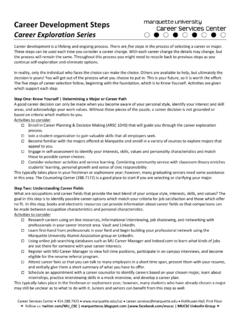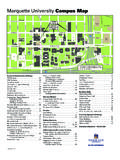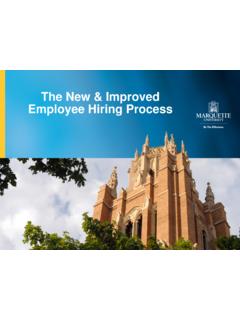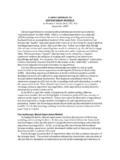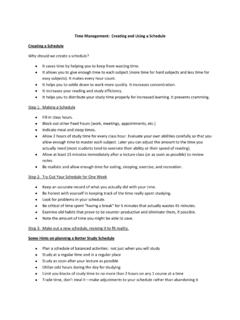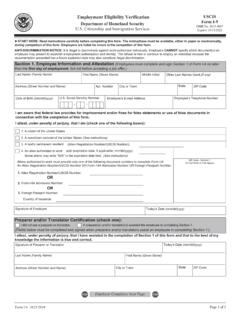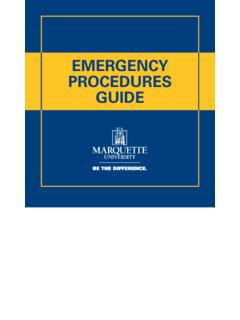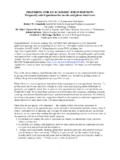Transcription of Job Shadowing - Marquette University
1 Job Shadowing Career Exploration Series Job Shadowing is a good way to find out more about careers with a minimal time commitment. Just like any kind of company/career research, job- Shadowing can occur at various stages of one's career development: Trying to determine a career path. After your career is launched but you've decided to explore new career directions When you know what career path to follow but want to learn more about specific companies by getting your foot inside. You can even narrow your search to the department level by Shadowing people in different departments of the same company to see which team you'd rather work with. The first step in the job Shadowing process is to find a professional with whom you would like to shadow and contact them in a professional manner. You can utilize online services, such as LinkedIn for alumni.
2 Please see the sample job Shadowing request below. Sample Job Shadowing Request Name, Title Company Address Dear Mr. LAST NAME: I am currently a [year in school] at Marquette University and I am considering [field] as a future career path. A family friend, [Name and Company], suggested that you might be willing to let me spend a day observing you so I can learn more about [field]. I would be extremely grateful if you allowed me to quietly observe you for a half- or full-day as you go about your usual schedule. If possible, it would be helpful if we also had a short interview toward the end of the Shadowing so I could ask you any questions I might have about [field] after observing your activities and actions. Thank you for considering my request. I will call you the week of [date] to see about scheduling the job Shadowing .
3 If you need to reach me before that time, please feel free to contact me via phone [number] or via email [address]. Thank you for your time and consideration. Sincerely, Name THE DAY OF YOUR JOB Shadowing EXPERIENCE. Dress as you would for a job interview with the company or at least at the level of dress others in the company wear. Don't be afraid to ask questions, but don't bombard the professional with so many questions that he or she can't get any work done. Take a notepad or even a small tape-recorder to record observations and answers to your questions. If your professional attends a meeting on your shadow day, by all means ask if you can sit in. You can learn a lot about a company's culture by how it conducts its meetings. Career Services Center Holthusen Hall, First Floor Follow us: | | | MUCSC LinkedIn Group.
4 Page 2 of 4. While your aim is to observe a typical work day, be open to unexpected opportunities such as attending a trade show or meeting of a professional organization with your professional. Be open to meeting as many people as possible during the experience. If you'd especially like to meet people in certain job functions, be sure to ask if your professional will introduce you. Observe everything! Note what technology is used in the job. Identify the must-have tools without which your professional can't function. Observe the surroundings in your professional's cubicle or office and determine how much of the environment reflects the professional's personality and how much is related to the job function or company. A stark workplace may indicate that the company frowns on personal touches. Notice how people dress and how casual or formal the atmosphere is.
5 Determine whether workers seem bubbly and happy, stressed and harried, or sullen and morose. Note whether people stay late or rush out at quitting time. Notice the communication channels in the workplace. Is most communication done by e-mail? Do co-workers frequently communicate with your professional by dropping by his or her workspace? Is communication primarily phone oriented? What's the level of formality in your professional's phone conversations? Is there a lot of gossip around the workplace? For truly nitty-gritty research, consider asking to see such documents as the company's organizational chart, a job description of your professional's position, samples of your professional's work products, and a sample performance review form to get an idea of how workers are evaluated. Be aware of the professional's and the organization's needs as you're Shadowing , and do your best not to interfere with the normal workflow.
6 If you have good rapport with the person you're Shadowing , consider asking for a resume critique and advice on interviewing at the company, as well as thoughts on coursework, internships, and work experience that will enable you to break into a job at that company. Remember that the professional you're Shadowing is now a valuable member of your network. Ask for a business card when you leave, and ask if the professional knows others in similar jobs that you might shadow. Also ask if you can stay in touch. WHAT TO ASK DURING THE JOB Shadowing EXPERIENCE. Questions about the Professional and the Role What is your job like? o A typical day? o What do you do? What are the duties/functions/responsibilities of your job? o What kinds of problems do you deal with? o What kinds of decisions do you make? o What percentage of your time is spent doing what?
7 O How does the time use vary? Are there busy and slow times or is the work activity fairly constant? How did this type of work interest you and how did you get started? How did you get your job? What jobs and experiences have led you to your present position? Can you suggest some ways a student could obtain this necessary experience? What are the most important personal satisfactions and dissatisfactions connected with your occupation? What part of this job do you personally find most satisfying? Most challenging? What are the various jobs in this field or organization? Why did you decide to work for this company? Career Services Center Holthusen Hall, First Floor Follow us: | | | MUCSC LinkedIn Group . Page 3 of 4. What are the advancement opportunities? What are the major qualifications for success in this occupation?
8 What are the skills that are most important for a position in this field? Questions about the Company Why do customers choose this company? Are you optimistic about the company's future and your future with the company? What does the company do to contribute to its employees' professional development? How does the company make use of technology for internal communication and outside marketing? (Use of e-mail, Internet, intranets, World Wide Web page, video conferencing, etc.). What sorts of changes are occurring in your occupation? How would you describe the working atmosphere and the people with whom you work? Is there a basic philosophy of the company or organization and, if so, what is it? What can you tell me about the corporate culture? What is the average length of time for an employee to stay in the job you hold?
9 Is there flexibility related to dress, work hours, vacation schedule, place of residence, What work-related values are strongest in this type of work (security, high income, variety, independence)? If your job progresses as you like, what would be the next step in your career? If your work were suddenly eliminated, what kinds of work do you feel prepared to do? With the information you have about my education, skills, and experience, what other fields or jobs would you suggest I research further before I make a final decision? What obligations does your employer place have on you outside of the ordinary work week? What social obligations go along with a job in your occupation? Are there organizations you are expected to join? Are there other things you are expected to do outside work hours? How has your job affected your lifestyle?
10 What are the salary ranges for various levels in this field? Is there a salary ceiling? What are the major rewards aside from extrinsic rewards such as money, fringe benefits, travel, From your perspective, what are the problems you see working in this field? What interests you least about the job or creates the most stress? Questions about the Career Path How does a person progress in your field? What is a typical career path in this field or organization? What is the best way to enter this occupation? If you could do things all over again, would you choose the same path for yourself? Why? What would you change? What are the educational, requirements for this job? What other types of credentials or licenses are required? What types of training do companies offer persons entering this field? Is graduate school recommended?
